Newsletter 10/2017
International Summerschools at CAWR
International Synthesis Summerschool: Complex Networks
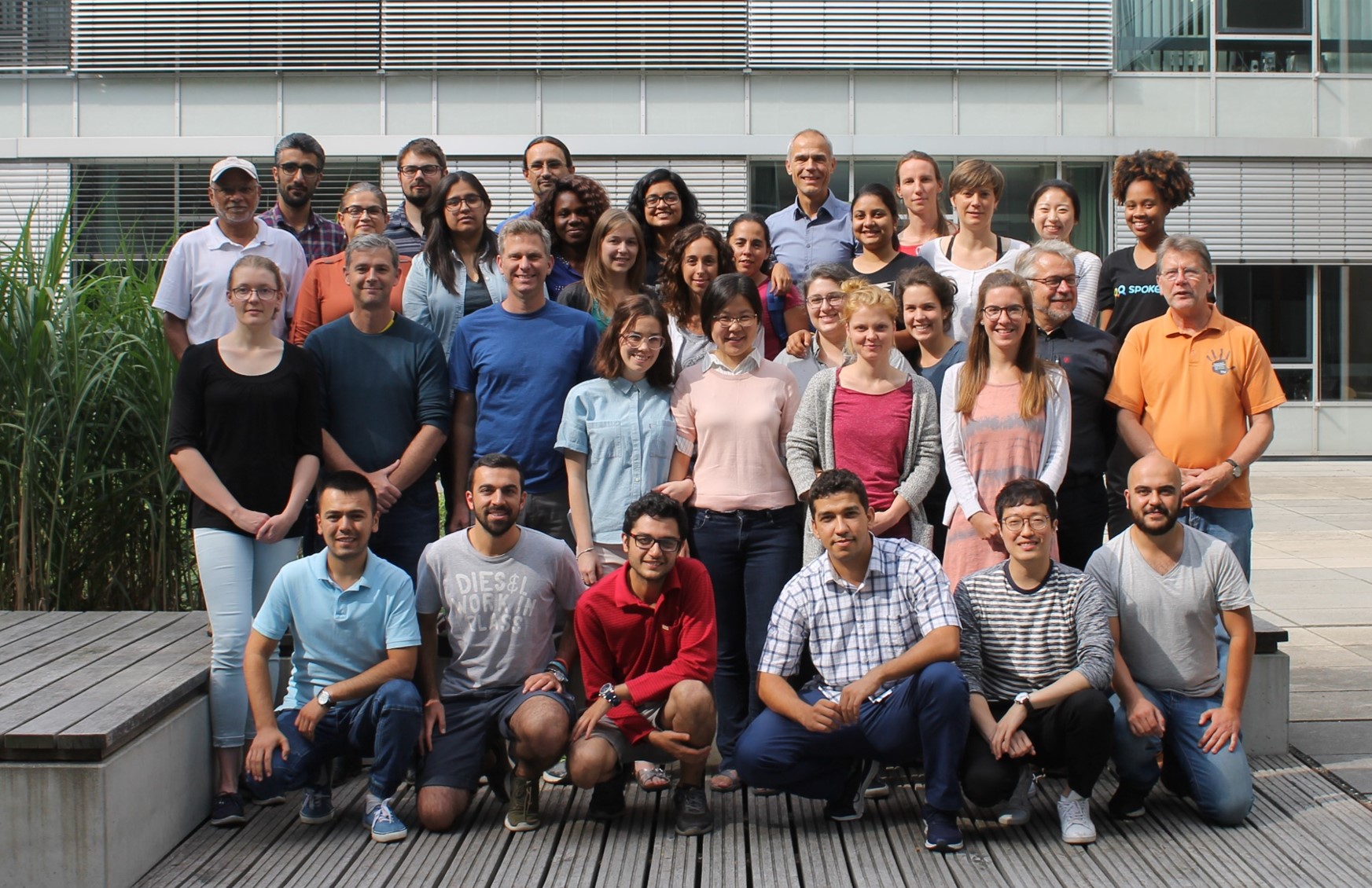 Participants and mentors of the International Synthesis Summerschool (© Hanna Rosentreter, TUD)
This August, an International Synthesis Summerschool on the topic „Network functional dynamics – Ecological, human and technological dimensions“ was organised by CAWR with contributions from scientists of the faculties Environmental Sciences, Traffic Sciences, Mathematics and Physics as well as the UFZ departments Aquatic Ecosystem Analysis, Hydrogeology and Computational Hydrosystems. 27 participants and 21 lecturers and mentors from 17 countries were part of the workshop at TU Dresden.
Participants and mentors of the International Synthesis Summerschool (© Hanna Rosentreter, TUD)
This August, an International Synthesis Summerschool on the topic „Network functional dynamics – Ecological, human and technological dimensions“ was organised by CAWR with contributions from scientists of the faculties Environmental Sciences, Traffic Sciences, Mathematics and Physics as well as the UFZ departments Aquatic Ecosystem Analysis, Hydrogeology and Computational Hydrosystems. 27 participants and 21 lecturers and mentors from 17 countries were part of the workshop at TU Dresden.
Networks are basic structures underlying many natural, social and technical systems in our environment – just think of engineered networks such as streets, power grids, sewer and water supply networks or natural structures such as river networks, neuronal networks in the brain and food webs. Also in social interactions and systems networks structures can be found. However, the understanding of complex real networks, their functions and dynamics, e.g. how networks develop, react to external disturbances and recover, is still scarce to date.
The worksop was funded by TU Dresden’s Institutional Strategy in the framework of the International Summerschools. It was already the fourth edition in a series of international synthesis workshops on complex networks. The format of these workshops encompasses only few strategic impulse lectures and short methodic inputs on tools for network analysis and modelling. The specific topic of this year’s edition, „Network functional dynamics“, was explored with a focus on infrastructure networks, river networks, neuronal networks, connections between trees and social networks. The majority of the workshop period was reserved for intensive group work, where young scientist jointly developed and tested new approaches for analysis of their respective networks, with close supervision by mentors and experienced students.
The Synthesis Summerschool was planned and carried out in close cooperation with the US American partners of CAWR, Purdue University and University of Florida, sending 5 mentors and 6 students to participate in the workshop. The 5 Dresden PhD students of the International Research Training Group on „Resilient Complex Water Networks“ were deeply involved in organizing the Summerschool. More Information here.
International INOWAS Summerschool on Managed Aquifer Recharge
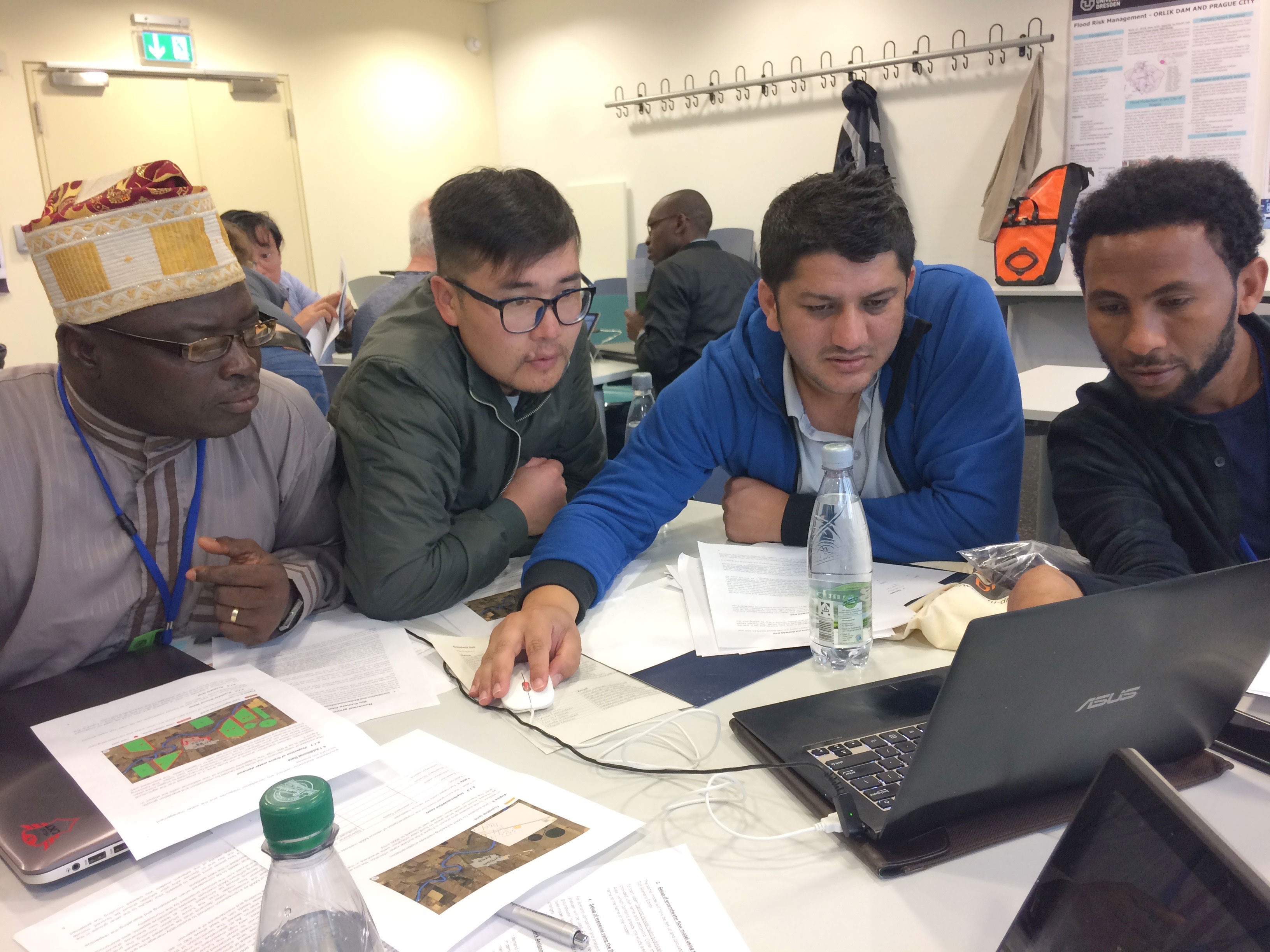 Participants of the International Summerschool during group work (© Catalin Stefan, TUD)
Participants of the International Summerschool during group work (© Catalin Stefan, TUD)
The Junior Research Group INOWAS, which is a member of the CAWR, initiated in September 2016 a series of annual summer schools aimed to promote sustainable groundwater management techniques and practices. Following the first event in 2016, the 2nd International INOWAS Summer School on Managed Aquifer Recharge (MAR) was organised from 4 to 15 September 2017 at the TU Dresden Department of Hydrosciences with financial support provided by the German Federal Ministry of Education and Research. During the two-week long courses, 20 participants from 17 countries were equipped with basic understanding of the benefits of MAR as an important component of sustainable water management. Different MAR technical solutions were presented from a very practical perspective enabling the participants to design, simulate and discuss different aspects of MAR implementation. Besides technical content, an overview was offered on the financial and economic aspects of MAR, as well as legal framework regulations and policies at European and international level. The content of the summer school was rounded up by three technical trips to MAR schemes in Pirna, Dresden and Berlin. More information here.
Scientific Events
NovCare Conference 2017
The 2017 edition of NovCare - International Conference on Novel Methods for Subsurface Characterization and Monitoring: From Theory to Practice took place on June 6-9 on the campus of TU Dresden. It was organized by CAWR (TUD Institute for Groundwater Management and UFZ Department Monitoring and Exploration Technologies) as well as the Kansas Geological Survey. The conference brought together scientists, students and practitioners from 18 countries who discussed new developments in the field of exploration techniques, e.g. geophysics, direct push technologies, hydrogeology and hydrogeochemistry, in situ measurements, wireless sensor networks and remote sensing. 8 Keynote Lectures were presented, with one highlight being the lecture given by Prof. Kamini Singha, the NGWA (National Ground Water Association) Darcy Lecturer 2017, with the title "A Tale of Two Porosities: Exploring Why Contaminant Transport Doesn’t Always Behave the Way It Should". The next NovCare Conference is planned to take place in spring 2019 in Golden, Colorado, USA. More information here.
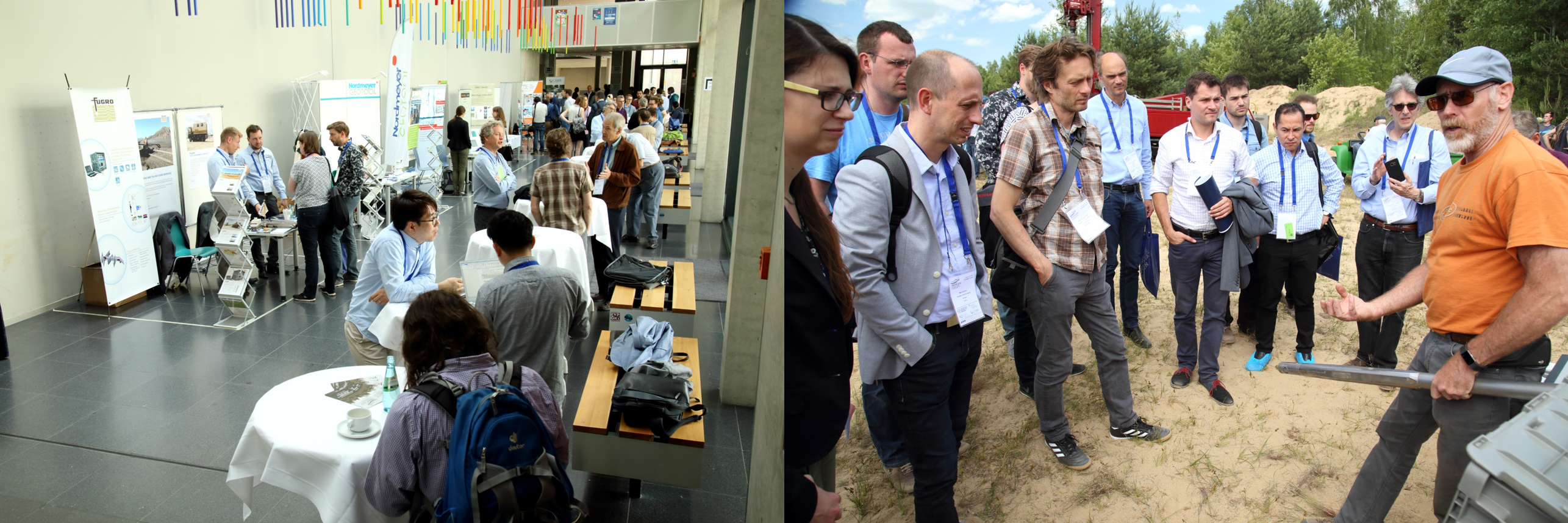 Poster session und field demonstration at NovCare 2017. © Falk Händel, TUD
Poster session und field demonstration at NovCare 2017. © Falk Händel, TUD
World Water Week 2017 - Water and Waste: Reduce and Reuse
Peter Krebs from CAWR presenting his talk on "Interfaces of urban waters and on pathways of compounds" © Serena Caucci (UNU-FLORES)
At World Water Week, taking place from August 27th to September 1st in Stockholm with a focus on "Water and Waste: Reduce and Reuse", UNU-FLORES and CAWR organized, in cooperation with DWA and FAO, a seminar on "Science faces practice: Benefits and risks of wastewater use". Wastewater is an important asset for the sustainable use of resources for food production, as it contains water as well as nutrients. The use of wastewater for irrigation is indispensable especially in water-scarce regions and is common practice in many places – however, the use of untreated wastewater in irrigation harbours health risks for producers and consumers. Consequently, also target 6.3 of the UN Sustainable Development Goals (SDGs) adressed halving the amount of untreated wastewater and a safe recycling and reuse. The goal of the seminar was to initiate a dialogue between wastewater treatment and irrigation experts as well as other stakeholders, and to discuss the state of the art concerning chances and risks of wastewater irrigation. After a suite of short input talks the participants exchanged views and experience concerning practices of wastewater reuse in their countries of origin as well as acceptance issues with regard to these practices in a World Café phase. More information and presentations here.
Water Research Horizon Conference 2017
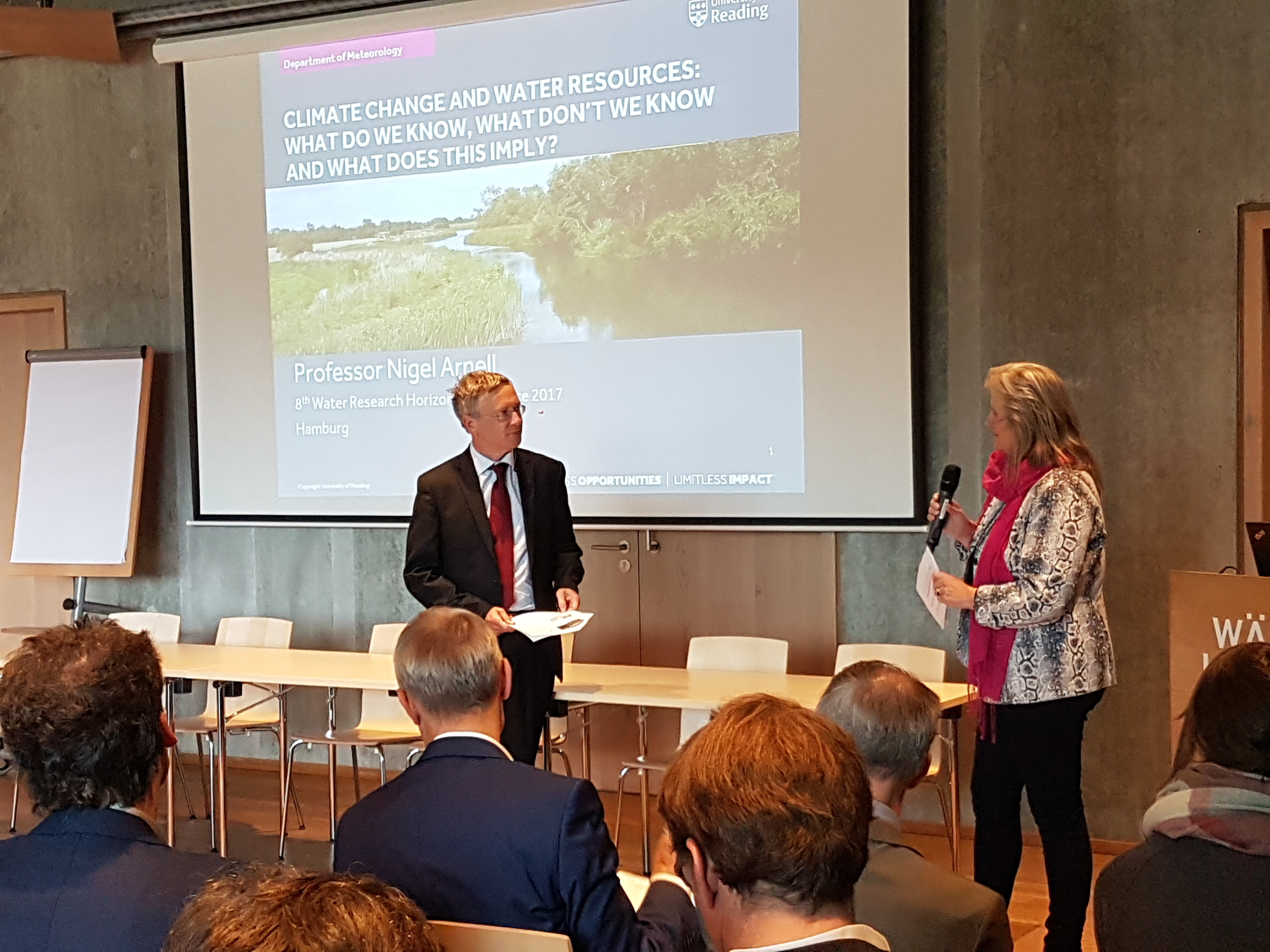 GERICS director Daniela Jacob and Keynote Speaker Nigel Arnell at the opening event (© S. Wiek, TUD)
GERICS director Daniela Jacob and Keynote Speaker Nigel Arnell at the opening event (© S. Wiek, TUD)
The 8th Water Research Horizon Conference (WRHC) took place from September 19-20 in Hamburg with the topic „Climate change impacts and rising adaptation and mitigation needs – future challenges for water related research”. XXX national and international scientists of different disciplines discussed water-related research questions and challenges in connection with climate change and necessary adaptation measures and strategies, also in the framework of the UN Sustainable Development Goals (SDGs) and the Paris Agreement on Climate Protection (COP21). During sessions and Open Space Workshops, the impact of climete change on water resources, urban water infrastructures and hydrological extreme events as well as Climate Change Water Governance were discussed among other topics. This year’s partner country, South Africa, invited participants for a workshop entitled "The water crisis: too little, too much, too bad, or lack of a plan? - a South African perspective". A special highlight was provided by the workshop on „Strategic goals and focus of future water research“ with representatives of BMBF und DFG, in the course of which the german water research community was invited to help shaping future research funding politics. In the framework of the conference, also the Water Monitoring Prize of the Dr. Erich Ritter Foundation was awarded to the geophysicist Dr. Florian Wagner for his developments of innovative field measurements technologies. This year’s WRHC was organized by Water Science Alliance e.V. in cooperation with the Climate Service Center Germany (GERICS). More information here.
Education
IRTG PhD students at Purdue University
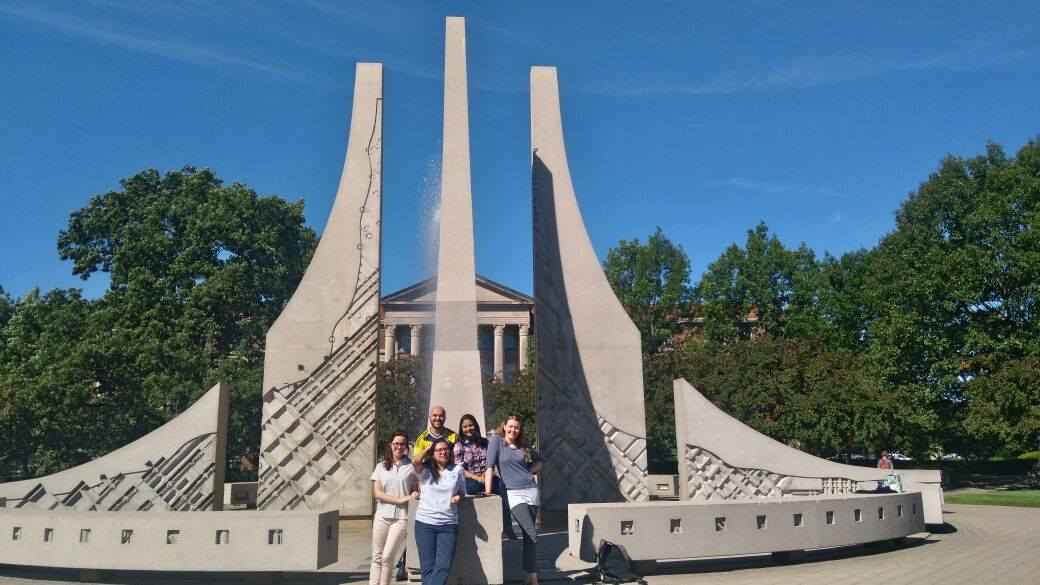 The 5 IRTG PhD students in front of Purdue Mall Water Sculpture at West Lafayette, IN. © J. Reyes Silva, TUD
The 5 PhD students of the International Research Training Group (IRTG) "Resilient Complex Water Networks" have successfully completed their first research stay abroad at Purdue University, one of CAWR’s two US American partner universities in the field of complex network research. They have spend 3-6 months each in West Lafayette, Indiana and have been supervised locally by Profs. Suresh Rao, Dev Niyogi, Antoine Aubeneau und Indrajeet Chaubey. During their guest stay, they established and intensified contacts and collaboration with graduate students of the partner working groups, learned new methods and developed innovative approaches to tackle their research questions. These cooperations were further solidified during the International Synthesis Summerschool in August in Dresden, in which several PhD students and mentors from Purdue participated. Overall, important progress has been made this year concerning the international cooperation with Purdue University, especially in the context of the IRTG. Research stays of Purdue PhD students at TU Dresden are planned for 2018.
The 5 IRTG PhD students in front of Purdue Mall Water Sculpture at West Lafayette, IN. © J. Reyes Silva, TUD
The 5 PhD students of the International Research Training Group (IRTG) "Resilient Complex Water Networks" have successfully completed their first research stay abroad at Purdue University, one of CAWR’s two US American partner universities in the field of complex network research. They have spend 3-6 months each in West Lafayette, Indiana and have been supervised locally by Profs. Suresh Rao, Dev Niyogi, Antoine Aubeneau und Indrajeet Chaubey. During their guest stay, they established and intensified contacts and collaboration with graduate students of the partner working groups, learned new methods and developed innovative approaches to tackle their research questions. These cooperations were further solidified during the International Synthesis Summerschool in August in Dresden, in which several PhD students and mentors from Purdue participated. Overall, important progress has been made this year concerning the international cooperation with Purdue University, especially in the context of the IRTG. Research stays of Purdue PhD students at TU Dresden are planned for 2018.
Faces of CAWR
Prof. André Lerch appointed to Chair of Process Engineering in Hydro Sciences
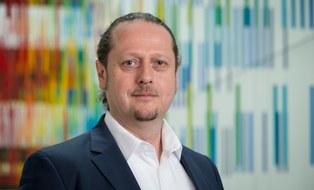 © K. Lassig, TUD
© K. Lassig, TUD
As of September 1st, Prof. Dr.-Ing. André Lerch is the new professor appointed to the Chair of Process Engineering in Hydro Sciences at TU Dresden. He has been the stand-in professor at the chair since October 2014 and has previously worked in the industry, at TU Dresden and at University of Duisburg-Essen. Prof. Lerch and his team focus mainly on the fields of membrane technology as well as Computational Fluid Dynamics (CFD) in drinking and process water and wastewater treatment, and of industrial water management in the frame of Integrated Water Resources Management (IWRM). More information on the current projects of the chair can be found here.

